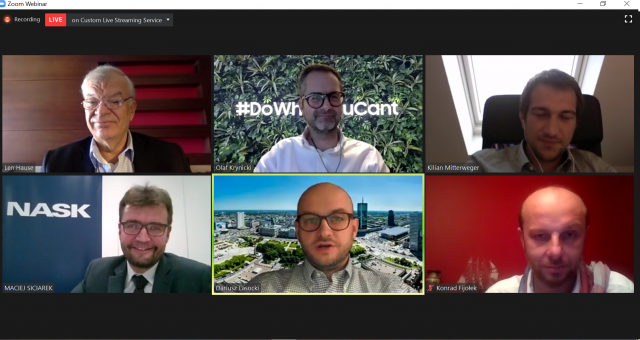Session
NASK / Samsung Electronics Polska
We live in a dynamically changing world, in a world of developing technologies, growing expectations but also challenges that come with it. What will our cities look like in the future? What solutions will make our life easier and to what extent simple, everyday matters will become dependent on ICT? How will we cope with growing threats and new challenges? Maybe it's time for reflection, time to assess our needs but also the risks associated with technologies that make it easier to meet them, time to evaluate existing and expected standards, the level of security of technology services we use every day. Smart City is not only a technology that makes our lives easier. It is not only handy and attractive gadgets that we like to surround ourselves with. We must feel responsible for the world around us so that Smart Cities do not turn out to be useless or even dangerous without a key and essential element: security. It is thanks to created and respected security standards that our Smart Cities systems will become not only safer but also more reliable, resistant to attacks and protecting our privacy. The security element in Smart City systems is like a vaccine for COVID-19 virus - without it, we will find it difficult to cope with the global challenge. With such a surge in software use, we need to define the directions of development and standards to which we will refer. If we don't take care of every weak point or vulnerability, it will be only a matter of time when the whole system will turn out to be weak and vulnerable to hacker attacks, so we need to take care of security at different levels. Some of those levels are local communities, local governments. They see and know best what is needed and how it works. In this context, bottom-up initiatives are also very valuable, paraphrasing the famous quote "Don't ask what Smart City can do for you, ask what you can do for the security of Smart City"
Moderator: Maciej Siciarek, NASK
Moderator II: Olaf Krynicki, Samsung Electronics Polska
Reporter: Katarzyna Sokół, NASK
Speakers:
- Dariusz Lasocki - former local government representative in Warsaw
- Konrad Fijołek - local government representative in Rzeszów
- Kilian Mitterweger, BSI Germany, Cyber Security in Smart Home and Smart City Section
- Len Hause, US State Dept., Senior Technology Advisor, Office of the Coordinator for Cyber Issues
- Theo Blackwell, Chief Digital Officer for London, The Mayors Office
Report
Our cities are constantly changing. They are more and more digital. I would say, that transformation started long time ago. According to Boyd Cohen a Smart City expert, we started at Smart City 1.0 where we were inspired by new technologies, through Smart City 2.0 where decisive role had public administration, till SmartCity 3.0 where inhabitants play major role in defining how Smart City should look like.
Smart City – Security issues, security challenges, security standards – how to build secure and comon approach to Smart City services implementation.
Question about main challanges -
- challenges to maintain (updating, monitoring of devices activities, ability to ensure proper and secure configuration)
Don’t we create a huge BOTNET?
All panelists have agreed on bottom up approach. Smart City should combine citizens’ needs with advanced technology.
Everyone addressed the need of proper education, awareness and need to develop culture of participation.
One of main security concerns are GDPR, growing number of internet connected devices, interoperability.
Due to diversity, experience and current positions of present panelists the approach and level of introducing and implementing Smart City solutions varied hence it made the discussion even more interesting.
All participants represented public sector therefore, everyone focus on the duties and responsiblities of the state. All the speaker underlined the importance of interoperability- connected intenet devices of various sectors, trust-being aware of the complexity of that issue, hollistic approach, communication with communities, raising awareness, education.
Cities can be used as physical platform to transform the technology – they are at the forefront. The government should consult and improve communication with the cities and local communities.
In order to implement secure Smart City – we all need to provide proper IoT infrastructure and security standards to introduce more advanced technology solutions as well as cybersecurity framework of products.
- Maciej Siciarek (moderator), NASK PIB …
- Olaf Krynicki (moderator), Samsung Electronics Polska
- Dariusz Lasocki - former local government representative in Warsaw
- Konrad Fijołek - local government representative in Rzeszów
- Kilian Mitterweger, BSI Germany, Cyber Security in Smart Home and Smart City Section
- Len Hause, US State Dept., Senior Technology Advisor, Office of the Coordinator for Cyber Issues
- Theo Blackwell, Chief Digital Officer for London, The Mayors Office
The concept and security of Smart City has no gender connection therefore it was not part of the discussion.
N/A
